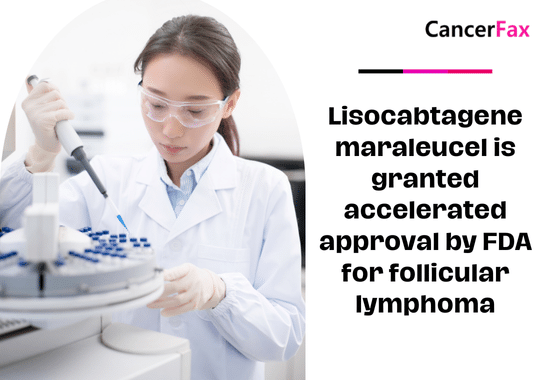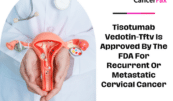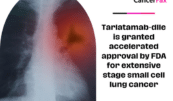Lisocabtagene maraleucel is granted accelerated approval by FDA for follicular lymphoma
May 2015: Lisocabtagene maraleucel (Breyanzi, Juno Therapeutics, Inc.) has been granted rapid approval by the Food and Drug Administration. This approval is specifically for people with relapsed or refractory follicular lymphoma (FL) who have undergone two or more rounds of systemic therapy.
The effectiveness of the treatment was assessed in a clinical trial called TRANSCEND-FL (NCT04245839). The test was done on people whose follicular lymphoma (FL) had come back or stopped responding to two or more lines of systemic therapy, which included an anti-CD20 antibody and an alkylating agent. The trial was open-label, multicenter, and single-arm in design, meaning that all participants received the same treatment and there was no control group. Patients were eligible to participate in the trial if they had sufficient bone marrow function to undergo lymphodepleting chemotherapy and had an ECOG performance status of 1 or lower.
Prior to lymphodepletion and subsequent delivery of lisocabtagene maraleucel, patients may undergo apheresis and receive bridging therapy to control the disease. Patients were given a single dose of lisocabtagene maraleucel two to seven days after finishing lymphodepleting chemotherapy.
This chemotherapy included fludarabine at a dose of 30 mg/m2/day and cyclophosphamide at a dose of 300 mg/m2/day, which were both given at the same time for three days. The primary efficacy population consisted of 94 patients who had a PET-positive illness either at the beginning or after receiving bridging therapy. These patients were administered the indicated dose range of the medication and were followed up for at least 9 months after their initial response.
The primary efficacy measures included the overall response rate (ORR), which is the percentage of patients who achieved a complete or partial response after receiving the lisocabtagene maraleucel infusion, and the duration of response (DOR) as determined by an independent review committee. The overall response rate (ORR) was 95.7% with a 95% confidence interval (CI) ranging from 89.5% to 98.8%. After a period of observation of 16.8 months (95% confidence interval: 16.3, 17.0), the median duration of response (DOR) was not determined (NR) (95% confidence interval: 18.04, NR).
The predominant nonlaboratory adverse effects, occurring in at least 20% of cases, were cytokine release syndrome (CRS), headache, musculoskeletal discomfort, exhaustion, constipation, and fever. The FDA has granted approval to lisocabtagene maraleucel, along with a risk evaluation and mitigation strategy, due to the potential for severe CRS and neurologic toxicities that could be fatal or life-threatening.
The recommended amount of lisocabtagene maraleucel is 90 to 110 × 106 CAR-positive viable T cells, with an equal number of CD4 and CD8 parts.
Susan Hau is a distinguished researcher in the field of cancer cell therapy, with a particular focus on T cell-based approaches and cancer vaccines. Her work spans several innovative treatment modalities, including CAR T-cell therapy, TIL (Tumor-Infiltrating Lymphocyte) therapy, and NK (Natural Killer) cell therapy.
Hau's expertise lies in cancer cell biology, where she has made significant contributions to understanding the complex interactions between immune cells and tumors.
Her research aims to enhance the efficacy of immunotherapies by manipulating the tumor microenvironment and exploring novel ways to activate and direct immune responses against cancer cells.
Throughout her career, Hau has collaborated with leading professors and researchers in the field of cancer treatment, both in the United States and China.
These international experiences have broadened her perspective and contributed to her innovative approach to cancer therapy development.
Hau's work is particularly focused on addressing the challenges of treating advanced and metastatic cancers. She has been involved in clinical trials evaluating the safety and efficacy of various immunotherapy approaches, including the promising Gamma Delta T cell therapy.
- Comments Closed
- June 19th, 2024






Breyanzi for follicular lymphoma, CAR-T for FL, CD19-targeted CAR-T, FDA-approved lymphoma therapy 2024, Indolent B-cell malignancy breakthrough, Lisocabtagene maraleucel approval, R/R follicular lymphoma treatment, Relapsed FL options
CancerFax is the most trusted online platform dedicated to connecting individuals facing advanced-stage cancer with groundbreaking cell therapies.
Send your medical reports and get a free analysis.
🌟 Join us in the fight against cancer! 🌟
Привет,
CancerFax — это самая надежная онлайн-платформа, призванная предоставить людям, столкнувшимся с раком на поздних стадиях, доступ к революционным клеточным методам лечения.
Отправьте свои медицинские заключения и получите бесплатный анализ.
🌟 Присоединяйтесь к нам в борьбе с раком! 🌟